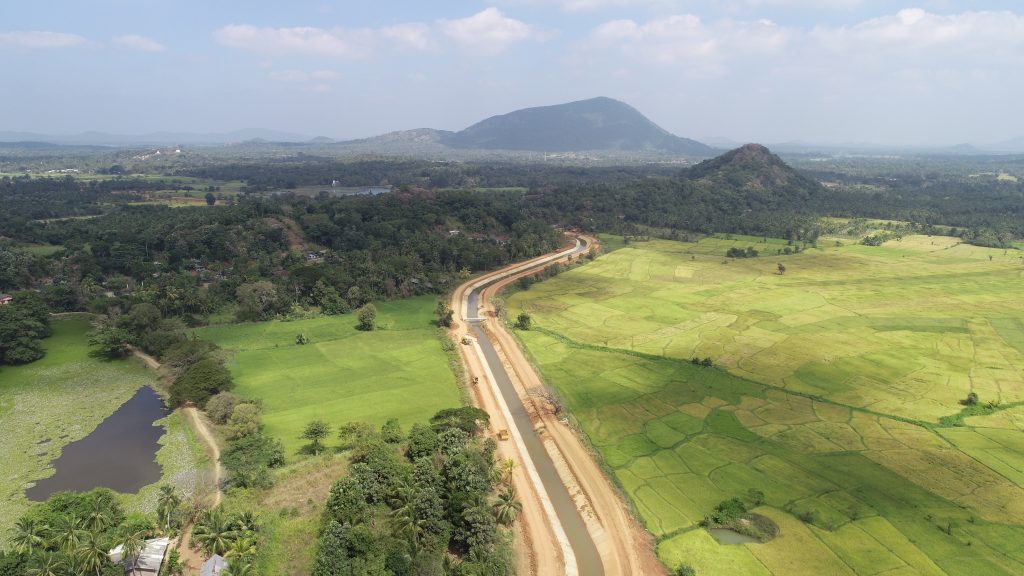I have been working for the Mahaweli Water Security Investment Program (MWSIP) for 7 years and now we have past the two-thirds mark. I will give you a quick recap: The MWSIP is a multi-billion dollar water resources development investment program being financed by the Government of Sri Lanka and Asian Development Bank to transfer water from the Mahaweli Basin to the northern dry region of the island. This will help mitigate against climate change (higher temperatures, more sporadic rainfall), enhance food security and promote economic development in the former conflict zone.
Progress despite Corona
My past year has been a busy one being the Project Director on behalf of Tractebel and our consortium partner Geoconsult (Austria). Even though Sri Lanka, like all countries in the region has experienced several peaks in cases of corona virus, our dedicated team has continued in our role as supervising Engineer while construction has managed to mostly stay on schedule with only slight delays. My colleagues and I had to become creative to be able to continue the work.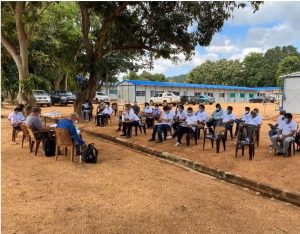 However, I had to discover that the global impacts on supply chains are also causing severe spikes in the cost of construction materials and exacerbating other challenges in the Program. I was living in Sri Lanka for most of the last year, and even during the lockdown periods and curfews the country was extremely resilient. Our office was open, even if we had to get curfew passes from the government to allow us to be on the streets.
However, I had to discover that the global impacts on supply chains are also causing severe spikes in the cost of construction materials and exacerbating other challenges in the Program. I was living in Sri Lanka for most of the last year, and even during the lockdown periods and curfews the country was extremely resilient. Our office was open, even if we had to get curfew passes from the government to allow us to be on the streets.
To my delight two large construction contracts commenced in March 2022, adding to the ten already under construction. One of these new packages will build the longest water tunnel in South Asia (28 km, 8-meter diameter). In December 2021, the government successfully negotiated with the Contractor (China State Construction Engineering Corp. Ltd.) to bring a second tunnel boring machine (TBM) to excavate from the other side of the tunnel and thereby reduce construction time by 2 years (so it can finish in only 4 years), which is remarkable. I am looking forward to the scheduled arrival of the first TBM at site from China in 2 months. The second will follow shortly afterwards. Each TBM and its associated equipment cost approximately $40 million.
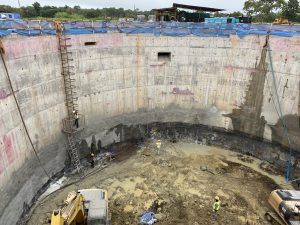 |
It is quite impressive to stand on top of the excavation of the 26-m diameter, 25-m deep starting shaft for the first TBM. Down there you can see my German colleague Mr. Schmitt. Can you find him?
Elephants & Sights
 One could think it is challenging enough for my colleagues and me to build in these times of global pandemic the largest water transfer project under construction in South Asia, but we found even more interesting challenges. Now you could ask what do elephants and World Heritage sights have in common with this tunnel? Let me explain it to you: Many environmentally sensitive protected areas lie along the route of the main water conveyance infrastructure, including this tunnel. Moreover, this area is home to a large population of elephants and the UNESCO World Heritage Site at Sigiriya Rock Fortress.
One could think it is challenging enough for my colleagues and me to build in these times of global pandemic the largest water transfer project under construction in South Asia, but we found even more interesting challenges. Now you could ask what do elephants and World Heritage sights have in common with this tunnel? Let me explain it to you: Many environmentally sensitive protected areas lie along the route of the main water conveyance infrastructure, including this tunnel. Moreover, this area is home to a large population of elephants and the UNESCO World Heritage Site at Sigiriya Rock Fortress.
Minneriya National Park
The area was designated as a national park on 12 August 1997, having been originally declared as a wildlife sanctuary in 1938. Among others the national park counts 160 species of birds, different amphibians and reptiles, leopards and monkeys. However, the park is famous for its herd of elephants. Up to 700 Sri Lankan elephants are attracted to grass fields on the edges of the reservoir during the dry season. In order to protect these holy elephants and all the other animals, my colleagues and I had to come up with a solution. In the end the program has introduced a total of 10 tunnels, ranging in length from 500 meters to 28 km.
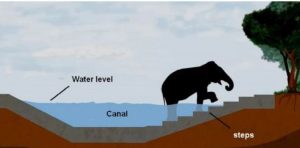 |
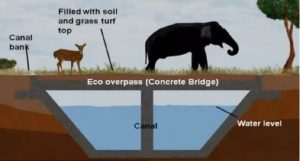 |
Here you can see one of the tunnels and “eco passes” my colleagues and I planned to protect the animals’ lives.
These tunnels are definitely more expensive to construct compared to building canals, but the government has justified the additional costs as part of the extensive environmental protection measures being implemented. This also includes building large “eco passes” to allow wildlife to be able to safely cross over the canals, particularly wild elephants, for which Sri Lanka is world famous. I think this is a very special but worthwhile challenge. It is nice to see that my work not only provides water for 100,000 families, but also improves the lives of protected animals.
Sigiriya Rock Fortress
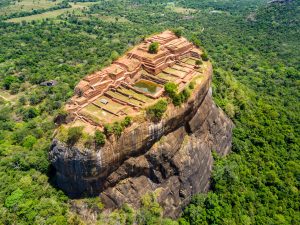
Sigiriya is an impressive monolith on which the ruins of a historical rock fortress are located. As I was taught the name is derived from “Singha Giri”, which means “Lion Rock”. In 1982 Sigiriya was declared a World Heritage Site by UNESCO. The tunnel’s underground path passes within four kilometers of the rock fortress of Sigiriya. Therefore, my colleagues and I had to plan the construction of the system underground to protect the fortress and the island’s unique forest environment.
High-level visit
My year started with a high-level visit to one our construction sites. In recognition of the Program’s importance to the country and being a showcase for ADB’s upcoming 55th Annual Meeting of ADB’s Board of Governors in Sri Lanka, ADB’s Vice President Mr. Shixin Chen and Country Director Mr. Chen Chen visited one of our construction sites on January 9th 2022. The ADB delegation was accompanied by Secretary to the Ministry of Irrigation Mr. Anura Dissanayake, the MWSIP Project Director Mr. D. B. Wijayaratne.
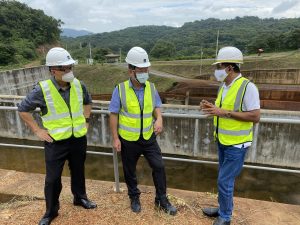 |
High-level visit for me and my colleagues: ADB’s Vice President and Country Director review progress with the Secretary to the Ministry of Irrigation.
The visit this high-level delegation helped to underscore the government’s commitment to finishing all construction packages by mid-2025 in order to set the foundation for when Phase 2 starts with an addition USD 2 billion in related projects.
Exciting outlook
For me it continues to be an amazing personal and professional experience working with my nearly 200 colleagues of all ages and disciplines in the PMDSC – with our collection of 6 offices in Colombo and across the Mahaweli Basin we are officially known as the Program Management, Design and Supervision Consultant. I am delighted to see that besides the ongoing works in 12 major civil works packages, our design team has finished the detailed engineering design and tender documents for 8 more construction contracts with an estimated cost of $400 million. All those additional packages were tendered in 2021 and are scheduled to start construction in the coming months.
I ended my last blog post in 2018 with the words: “We are contributing to Sri Lankas positive development: With our team of almost 100 engineers and diverse consultants we are helping the government to implement what will become one of the world’s largest water resource development projects.” After another 4 years of work, I couldn’t be happier to participate in the expansion of an initiative of such great significance. One that will provide irrigation and drinking water to over 100,000 families across a huge swath of land in northern Sri Lanka. The irrigation tunnel and its associated systems will bolster both quality of life and economic activities in the region. This is perfectly aligned with Tractebel’s pursuit of creating positive impact towards a sustainable world, where people, planet and profit collectively thrive.
As I like saying: “Never a dull moment!” With this in mind we are looking forward to the next construction phases in 2022 and beyond and are excited about the challenges that await us. We are ready!
Here you find more information about the Mahaweli Water Security Investment Program (MWSIP).
